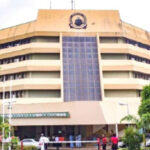
Editors and their reporters must be savouring these times. They do not have to chase the news. The news chases them to their homes and offices. It is the election season. When the big masquerades are out in full force in the political market square as they are now, there are no dull moments in the republic. There is an avalanche of news; an information overload. As the ancient mariner might have put it, we have news, news, everywhere, competing for limited spaces in the print media and limited air time in the electronic media.
With so much news no newspaper can go to bed with an empty page or pages. There is a piece of news to make the grade in every section of the newspaper. An editor who has ever experienced the pressure of a news draught would appreciate that. The politicians are the news makers. They thunder; they explode. They blow their own horns or silence other people’s horns. It is all news, lapped up by editors and their reporters. Political competition is about winning the verbal warfare in the public space. The news media are that public space where the masquerades, big and small, do their own thing to our amusement or consternation.
In an election season, editors deal with the irony of too much news but not enough facts. Despite the information overload in an election season it seems to me that the capacity of the news media to properly inform and educate the public is impaired by the burden of news overload. There must be such a thing as too much of a good thing. The politician does not seek to inform and educate the public. He lies, if he has to; he misinforms, if he has to; he miseducates, if he has to; and he misleads if he has to. His sole objective is to sell himself to the public by whatever means he finds convenient or appropriate.
In this election season, the big news is the defection, individual or mass, from one political party to another. APC and PDP are the main gladiators. Some are leaving APC for PDP and others are leaving PDP for APC. The titillating news of these defections overwhelms editors and their reporters. I have a sneaking feeling that an editor goes to bed at night praying that the next day would bring news of some political big fishes changing their watery habitats.
Defection is everybody’s news. The enterprising editor or reporter would go for what is behind the news. I see no attempts by our editors and their reporters to find out why this is really happening to our politics. We all assume that the defections reflect on problems within each political party. We routinely blame the defections either on the lack of internal democracy or the ambitions of the defectors to find a safer berth for the realisation of their political ambitions. There is a telling evidence of these among the defectors. But do they tell the whole story? Are we right to make these assumptions? Are there other reasons why some people holding exalted public offices would risk them by defecting from a ruling party to a party out of power? Should the news media not dig into the reasons why people defect? Does political opportunism sufficiently explain it all?
The inability of the news media to raise and address these and other issues about the defections means that they fail in their fundamental duty of properly informing and educating the public about the happenings in the political kingdom. My take is that the reading public is not being served.
The virus of defections was introduced into our party politics in 2014 when the PDP found itself bleeding badly from the multiple wounds inflicted on it by its own members, some of whom had been two-term governors or three-term legislators. The new attractive kid on the block then was the then presidential candidate of APC, General Muhammadu Buhari. PDP fatigue had set in. People flocked to him and his new party and left President Goodluck Jonathan ruing the uncertainty of politics, Nigerian politics.
Perhaps, Jonathan was not the problem. There might have been other forces at play. But here we are. Three years later and with Buhari in the saddle, what happened to PDP is happening to APC. Why are there mass defections from APC back to PDP? Has APC fatigue set in? Is this about Buhari? Is it about his style of governance? Is it about the poor management of the party itself?
As you can see, there is an overload of information but the basic facts are lacking. This leaves the public in a lurch, confused about what is happening in the political parties and in the republic. In an election season, it is easy to publish the news without attempts to educate the public because it is the season of salacious news. I once noted in this column that one area the news media are failing the republic is that they make no attempts to tell us who our potential political leaders are. The foisting of unknown quantities on us as our governors and legislators by the moguls who run the political parties will continue as long as the news media abdicate that critical responsibility.
At times like these, an editor must watch out for some dangerous banana peels thrown in his path by the news makers. They have a different take on truth and social responsibility from that of the editor.
Caution: Beware of the missing facts in the press releases and the unsolicited interviews. Opinions are good but their relevance should be to support facts, not blur them. I have some sympathy for editors whose vision of the news is blurred by the information overload. It is the price he pays for too much information floating on few facts.

 Join Daily Trust WhatsApp Community For Quick Access To News and Happenings Around You.
Join Daily Trust WhatsApp Community For Quick Access To News and Happenings Around You.


